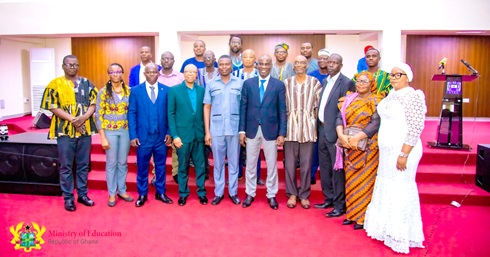The Minister of Education, Haruna Iddrisu, has charged the Bolgatanga Technical University (BTU) to take a bold leadership role in developing sustainable agricultural practices that support food security and rural transformation in the Upper East Region.
He urged the university to link the institution’s research and academic work directly to the livelihoods of the communities around it.
“Sustainable agriculture must not just be a theory in the classroom.
The BTU has a responsibility to translate its technical expertise into everyday solutions that improve farming yields, ensure climate resilience and create jobs for young people in the region,” the minister noted.
Mr Iddrisu stated this when he inaugurated a 19-member governing council of the BTU in Accra last Thursday, emphasising that the government’s vision for technical universities was not just to produce graduates, but to train innovators and problem-solvers.
“The strength of our education system lies in its ability to solve problems. The BTU must rise to that task in agriculture and beyond,” he added.
Role, support
With Ghana’s agriculture sector facing challenges of climate change, low productivity and limited mechanisation, technical universities such as the BTU have a unique opportunity to bridge the gap between policy and practice.
The Education Minister thus tasked the BTU to “take full advantage of the ecological, agricultural and unique climate conditions in the Upper East Region and reposition the university to focus on the training of the needed human capital to use research to improve subsistence farming in the region.”
He assured the council that the university would benefit from a US$5 million grant from the Government of Italy under a bilateral arrangement to boost Technical and Vocational Education and Training (TVET) in Ghana.
The grant, managed through the Ministry of Education, would support infrastructure upgrades, acquiring modern equipment and developing new technical programmes that respond to labour market needs.
The minister commended the vice chancellor for his efforts in getting a multi-purpose lecture facility with offices and laboratories to be built by the faculty and students to enrich and give students exposure to practical skills.
“Let me emphasise that due process, particularly the procurement processes and laws of Ghana, must be respected in both letter and spirit,” he advised the university's VC.
He acknowledged the “aggressive” programmes the current leadership had introduced and was confident they would attract many potential students once they saw immediate benefits for the surrounding communities.
He, however, cautioned that the university should act within the limits of the regulatory authority of the Ghana Tertiary Education Commission (GTEC).
Governing Council
Dr Bishop Akolgo, a developmental economist, chairs the council.
Speaking on behalf of the members, Dr Akolgo gave the assurance that the council would ensure that the BTU created the right environment for teaching and learning.
He further pledged that the council would work “to position the university at the centre of the region's transformation, from the poverty headquarters into a more resilient net exporter of the staples that you can harness from the north.”

